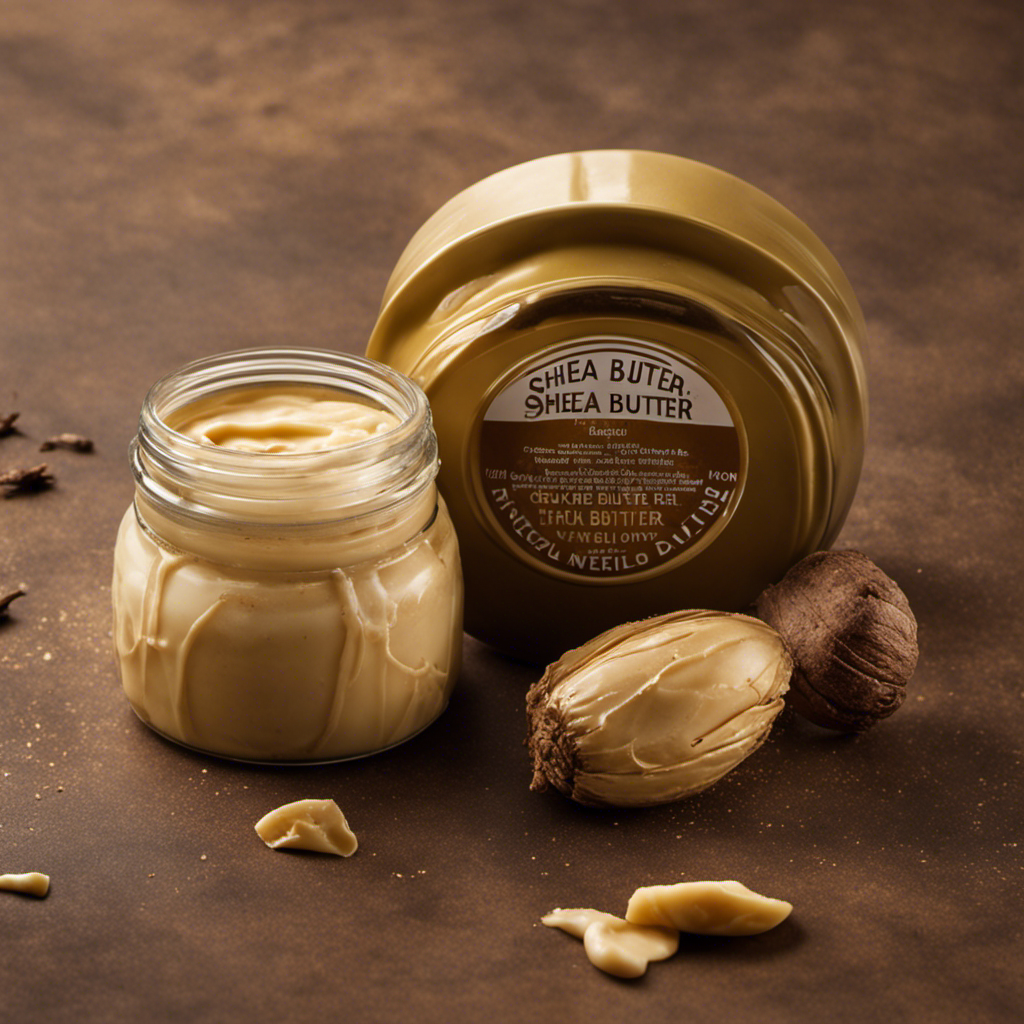Is Butter a Superfood? Unpacking Nutritional Claims
As someone who loves indulging in creamy, rich flavors, I’ve often wondered if butter could possibly be considered a superfood. It’s time to dive into the nutritional claims surrounding this beloved ingredient and separate fact from fiction.
In this article, we’ll explore the true nutritional profile of butter, understand what makes a food a superfood, and examine the role butter can play in a balanced diet.
So, grab a slice of toast and let’s unpack the truth about butter’s place in our diets.
Key Takeaways
- Butter is primarily composed of milk fat and has a higher saturated fat content compared to other fats like olive oil and avocado.
- Superfoods are not a scientific classification but a marketing term, and no single food can provide all the nutrients our bodies need.
- Butter does have nutritional benefits, such as being a good source of vitamin A and providing essential fatty acids, but moderation is crucial due to its high calories and saturated fat content.
- Alternative spreads made from vegetable oils like olive, avocado, or coconut oil tend to be lower in saturated fat and may contain heart-healthy monounsaturated fats, making them a healthier choice compared to butter.
The Nutritional Profile of Butter
Butter is high in saturated fat, which can increase your risk of heart disease. Understanding the composition of butter is essential when considering its nutritional value. Butter is primarily composed of milk fat, which contains a mixture of saturated, monounsaturated, and polyunsaturated fats. However, the predominant fat in butter is saturated fat, making up about 63% of its total fat content.
When compared to other fats, butter has a higher saturated fat content. For instance, olive oil and avocado contain mostly monounsaturated fats, which are considered heart-healthy. On the other hand, butter contains higher levels of saturated fats, which have been linked to an increased risk of heart disease.
In terms of nutritional comparisons, butter is relatively low in essential nutrients. While it does contain small amounts of vitamins A, E, and K, as well as trace amounts of minerals like calcium and phosphorus, these quantities are minimal compared to other food sources. In contrast, other spreads like margarine or nut butter often contain added vitamins and minerals.
It is important to note that while butter may not be a significant source of essential nutrients, it does provide flavor and texture to dishes, making it a staple in many culinary traditions. However, excessive consumption of butter can contribute to an unhealthy imbalance in your diet.
Understanding Superfoods
While there are many foods that are touted as being incredibly beneficial for our health, it is important to understand what it means for a food to be classified as a ‘superfood.’
The term ‘superfood’ is not a scientific classification, but rather a marketing term used to describe foods that are rich in nutrients and may provide health benefits. Superfoods are typically high in antioxidants, vitamins, minerals, and other beneficial compounds.
However, it is important to note that no single food can provide all the nutrients our bodies need, and a balanced diet is key for good health.
There are many myths surrounding superfoods, and it is important to debunk them. One common myth is that superfoods can cure or prevent diseases. While some superfoods may have certain health benefits, they are not a substitute for medical treatment or a healthy lifestyle.
Another myth is that superfoods are expensive and hard to find. While some superfoods may be more expensive or difficult to find, there are also many affordable and easily accessible options available.
It is also important to note that superfoods are not a magic solution for weight loss. While they can be part of a healthy diet, weight loss requires a combination of a balanced diet, regular exercise, and a healthy lifestyle overall.
Understanding superfoods is about recognizing that they can be a part of a healthy diet, but they are not a cure-all. Incorporating a variety of nutrient-rich foods into your diet, such as fruits, vegetables, whole grains, lean proteins, and healthy fats, is key for overall health and well-being.
Superfoods can be a great addition to a balanced diet, but it is important to focus on overall dietary patterns rather than individual foods. By debunking the myths and understanding the role of superfoods in a healthy diet, we can make informed choices and prioritize our health.
Butter’s Role in a Balanced Diet
When it comes to butter, there are several key points to consider.
First, butter does have nutritional benefits, such as being a good source of vitamin A and providing essential fatty acids.
However, it is important to compare butter to alternative spreads, as some may offer lower saturated fat content and additional nutrients.
Lastly, moderation is crucial when consuming butter, as it is high in calories and saturated fat, which can increase the risk of heart disease.
Butter’s Nutritional Benefits
If you’re looking for a spread that can provide essential vitamins and minerals, you might find butter to be a good option. While it is high in saturated fat, butter does have some nutritional benefits. Here are a few reasons to consider incorporating butter into a plant-based lifestyle:
- Butter is a rich source of fat-soluble vitamins like A, D, E, and K, which are important for various bodily functions.
- It contains small amounts of minerals like selenium, zinc, and manganese, which play a role in supporting overall health.
- Butter also provides conjugated linoleic acid (CLA), a naturally occurring fatty acid that has been associated with potential health benefits.
Transitioning to the next section, it’s important to compare butter to alternative spreads to understand the pros and cons of each option.
Butter Vs. Alternative Spreads
Let’s compare butter to alternative spreads to see which option might be the best choice for you.
With the rise in popularity of plant-based diets, many people are seeking butter alternatives. These spreads are often made from vegetable oils, such as olive, avocado, or coconut oil.
One of the main health effects to consider is the type of fat present in each option. Butter is high in saturated fat, which has been linked to an increased risk of heart disease. In contrast, alternative spreads tend to be lower in saturated fat and may even contain heart-healthy monounsaturated fats.
Additionally, some spreads are fortified with vitamins and omega-3 fatty acids, providing added nutritional benefits.
When choosing between butter and alternative spreads, consider your dietary goals and the potential impact on your health.
Moderation in Butter Consumption
To moderate your butter consumption, it’s important to be mindful of portion sizes and incorporate other healthy fats into your diet. Butter can be a delicious addition to meals, but it’s high in saturated fats, which can increase the risk of heart disease when consumed in excess.
Here are some tips to help you find a balance:
- Use spreads made from healthy fats, like avocado or nut butter, as alternatives to butter.
- Measure out your portions to avoid overindulging. A serving of butter is about one tablespoon.
- Experiment with herbs and spices to enhance the flavor of your meals, reducing the need for excessive butter.
Debunking Butter’s Bad Reputation
You may be surprised to learn that butter’s bad reputation may not be entirely accurate. There have been numerous claims made about butter’s negative effects on health, but when we look at the evidence, we find that many of these claims are not supported by scientific research.
One of the most common claims is that butter negatively affects metabolism, leading to weight gain and increased risk of heart disease. However, recent studies have debunked these claims and found that butter’s effect on metabolism is not as detrimental as once believed. In fact, some research suggests that moderate butter consumption may actually have a positive impact on metabolism.
One study published in the European Journal of Nutrition found that the consumption of butter, in moderation, was not associated with an increased risk of heart disease or metabolic syndrome.
Another study published in the American Journal of Clinical Nutrition found that the consumption of butter did not lead to significant changes in cholesterol levels or markers of inflammation. The researchers concluded that butter can be included as part of a healthy diet, as long as it is consumed in moderation.
It’s important to note that while butter can be part of a balanced diet, moderation is key. Like any food, excessive consumption of butter can contribute to weight gain and other health issues. However, in moderation, butter can be enjoyed as part of a healthy and diverse diet.
The Health Benefits of Butter
When enjoying butter in moderation, it can be a tasty addition to a balanced diet. Contrary to popular belief, butter does offer some health benefits. Here are three reasons why butter can be a good choice for your diet:
-
Rich in Vitamins: Butter is a natural source of fat-soluble vitamins like vitamin A, D, E, and K. These vitamins play vital roles in maintaining good health. Vitamin A is essential for vision and immune function, while vitamin D promotes calcium absorption and bone health. Vitamin E acts as an antioxidant, protecting cells from damage, and vitamin K aids in blood clotting.
-
Healthy Fats: Butter contains both saturated and unsaturated fats. While saturated fats have been linked to health risks when consumed in excess, moderate consumption of saturated fats is not associated with an increased risk of heart disease. Additionally, the unsaturated fats in butter, such as oleic acid, have been shown to have potential health benefits, including reducing inflammation and improving insulin sensitivity.
-
Versatile Cooking Applications: Butter is not only delicious but also versatile in cooking. It adds richness and flavor to dishes and can enhance the taste of vegetables, meats, and baked goods. It can be used for sautéing, baking, and even making sauces and dressings.
While it’s important to keep in mind that butter should be enjoyed in moderation due to its high calorie and fat content, it can be a part of a healthy diet. Including a variety of nutrient-dense foods and balancing calorie intake is key to maintaining overall health and well-being.
Butter and Heart Health: Separating Fact From Fiction
When it comes to heart health, there is often confusion surrounding the role of saturated fats and cholesterol.
In this discussion, I will explore the scientific evidence regarding saturated fats and cholesterol and their impact on our cardiovascular health.
Additionally, I will delve into the ongoing debate between butter and margarine, examining the pros and cons of each to help inform our dietary choices.
Saturated Fats and Cholesterol
If you’re looking to understand the role of saturated fats and cholesterol in your diet, it’s important to consider the nutritional claims surrounding butter as a potential superfood.
Saturated fats: Butter is high in saturated fats, which have long been associated with an increased risk of heart disease.
Cholesterol: Butter is also a source of dietary cholesterol, which can contribute to elevated levels of LDL cholesterol in the blood.
Heart health and butter consumption: Consuming too much saturated fat and cholesterol from foods like butter can raise LDL cholesterol levels, increasing the risk of heart disease.
While butter can add flavor to meals and provide essential nutrients, moderation is key due to its high saturated fat and cholesterol content. It is important to balance butter consumption with other heart-healthy fats, such as olive oil and avocado, and to consider the overall diet for optimal heart health.
Butter Vs. Margarine Debate
The debate between butter and margarine centers around their different nutritional profiles and their potential impact on heart health.
Butter, made from animal fat, is high in saturated fat and cholesterol, which are known to increase the risk of heart disease.
On the other hand, margarine is a butter alternative made from vegetable oils. It was initially developed as a healthier option, as it contains unsaturated fats that can help lower cholesterol levels. However, early versions of margarine were made using hydrogenation, which created harmful trans fats. Nowadays, most margarines are made without trans fats, making them a healthier choice compared to butter.
When it comes to nutritional comparison, margarine tends to be lower in saturated fat and cholesterol, while also containing beneficial omega-3 and omega-6 fatty acids.
However, it’s important to note that not all margarines are created equal, so it’s essential to read labels and choose options that are free from trans fats and low in saturated fat.
Butter Vs. Margarine: Making the Healthiest Choice
To make the healthiest choice between butter and margarine, you should consider the nutritional benefits and drawbacks of each option.
While butter is a popular choice for its rich taste and natural origins, margarine has gained popularity as a butter alternative due to its lower saturated fat content.
Here are some key points to consider when deciding between butter and margarine:
-
Butter:
-
Rich in saturated fats, which can raise cholesterol levels and increase the risk of heart disease.
-
Contains vitamins A, D, and E, which are important for overall health.
-
Provides a good source of butyric acid, a type of fatty acid that may have anti-inflammatory effects.
-
Margarine:
-
Usually made from vegetable oils, which are low in saturated fats and cholesterol.
-
Often fortified with vitamins and minerals to mimic the nutritional profile of butter.
-
Some margarines may contain trans fats, which are known to increase the risk of heart disease.
When considering the health implications of butter alternatives, it is important to note that moderation is key. Both butter and margarine can be part of a balanced diet when consumed in moderation. It is also important to read labels and choose margarines that are low in trans fats and free from hydrogenated oils.
Ultimately, the choice between butter and margarine comes down to personal preference and individual health needs. Consulting with a healthcare professional or registered dietitian can provide personalized guidance on which option is best for you.
Incorporating Butter Into a Plant-Based Lifestyle
When following a plant-based lifestyle, you can still enjoy the rich flavor and creamy texture of butter alternatives. As a vegan, I have found that there are many delicious and healthy substitutes for butter that can be used in a variety of recipes. These alternatives not only provide a similar taste and texture but also offer additional health benefits.
One of my favorite butter alternatives is coconut oil. It has a smooth consistency and a subtly sweet flavor that adds a delightful touch to both savory and sweet dishes. Coconut oil is also rich in medium-chain triglycerides (MCTs), which have been linked to several health benefits, including improved brain function and increased fat burning.
Another great option is avocado. It can be mashed and used as a spread or melted and used in baking. Avocado is a nutrient-dense fruit that is packed with heart-healthy monounsaturated fats, fiber, and vitamins.
Lastly, nut butters like almond or cashew butter can be a delicious and nutritious substitute for butter. They add a rich, nutty flavor to recipes and provide a good source of protein, healthy fats, and essential nutrients like vitamin E and magnesium.
Here’s a table to summarize the nutritional benefits of these butter alternatives:
| Butter Alternative | Health Benefits |
|---|---|
| Coconut oil | Rich in MCTs, which can improve brain function and increase fat burning |
| Avocado | High in heart-healthy monounsaturated fats, fiber, and vitamins |
| Nut butter | Good source of protein, healthy fats, vitamin E, and magnesium |
Incorporating these butter alternatives into your plant-based lifestyle not only adds flavor and creaminess to your dishes but also provides a range of health benefits. So go ahead and enjoy the goodness of these alternatives while maintaining a vegan lifestyle.
The Role of Butter in Weight Management
When considering the role of butter in weight management, it is important to examine its caloric content, satiety factor, and impact on cholesterol levels.
Butter is high in calories, with approximately 100 calories per tablespoon, which can contribute to weight gain if consumed in excess.
Additionally, studies have shown that the high fat content of butter may increase feelings of satiety, potentially leading to a decreased overall calorie intake.
However, it is important to note that butter is also high in saturated fat, which has been linked to increased cholesterol levels and an increased risk of heart disease.
Caloric Content of Butter
You might be surprised by how many calories are packed into a single tablespoon of butter. It contains a whopping 102 calories, making it a dense source of energy.
When it comes to weight management, it’s important to be mindful of the caloric content of foods we consume. Here are some key points to consider:
- Butter is high in saturated fat, which can contribute to weight gain when consumed in excess.
- The caloric density of butter makes it easy to consume a significant number of calories in a small amount.
- While butter can be enjoyed in moderation as part of a balanced diet, it’s important to be mindful of portion sizes to maintain a healthy weight.
Understanding the caloric content of butter can help individuals make informed choices about their dietary intake and support their weight management goals.
Satiety Factor of Butter
Understanding the satiety factor of butter can help individuals maintain a healthy weight and make informed choices about their dietary intake. While butter is often associated with weight gain due to its high fat content, research suggests that it may actually have satiety benefits that can aid in weight loss.
Butter is rich in healthy fats that have been shown to increase feelings of fullness and reduce overall calorie intake. Additionally, the combination of fat and protein in butter can slow down digestion, keeping you satisfied for longer periods of time. This can prevent overeating and contribute to weight management.
However, it is important to note that portion control is still crucial, as butter is high in calories.
Transitioning into the subsequent section about the impact of butter on cholesterol levels, it is essential to consider the overall nutritional profile of butter when incorporating it into a balanced diet.
Impact on Cholesterol Levels
In my previous subtopic, I discussed the satiety factor of butter.
Now, let’s dive into the impact of butter on cholesterol levels and its potential risks on cardiovascular health.
- Butter is high in saturated fat, which can raise LDL (bad) cholesterol levels in the blood.
- Elevated LDL cholesterol is a risk factor for heart disease and stroke.
- Studies have shown that replacing saturated fats with unsaturated fats, such as those found in olive oil or avocado, can help lower LDL cholesterol levels.
While small amounts of butter can be enjoyed as part of a balanced diet, it is important to be mindful of its impact on cholesterol levels.
To maintain cardiovascular health, it is recommended to consume saturated fats in moderation and prioritize unsaturated fats from plant-based sources.
Butter as a Source of Essential Nutrients
Butter provides essential nutrients that your body needs for optimal health. While it is often criticized for its high saturated fat content, it is important to recognize that butter also offers several nutritional benefits. Let’s take a closer look at the essential nutrients found in butter and how they contribute to our overall well-being.
| Nutrient | Function |
|---|---|
| Vitamin A | Supports vision, immune function, and cell growth and development |
| Vitamin D | Promotes calcium absorption and bone health |
| Vitamin E | Acts as an antioxidant, protecting cells from damage |
| Vitamin K | Plays a crucial role in blood clotting and bone metabolism |
These essential nutrients are crucial for various bodily functions and cannot be overlooked. Vitamin A, for example, is necessary for maintaining healthy vision and a strong immune system. Vitamin D aids in the absorption of calcium, promoting strong bones and teeth. Vitamin E acts as an antioxidant, protecting our cells from oxidative damage. Lastly, vitamin K is essential for blood clotting and bone metabolism.
In addition to these vitamins, butter also contains small amounts of other important nutrients like calcium, phosphorus, and selenium. While these amounts may not be as significant as in other food sources, they still contribute to our overall nutrient intake.
It is important to note that while butter does offer these nutritional benefits, it should be consumed in moderation as part of a balanced diet. Excessive intake of saturated fats can increase the risk of heart disease. Therefore, it is recommended to choose healthier fats, such as olive oil or avocado, as the primary source of dietary fat and to limit butter consumption.
Frequently Asked Questions
Can Butter Be Consumed as a Standalone Superfood for Optimal Health?
Butter can play a role in weight management and metabolism as part of a balanced diet. It contains healthy fats that can help promote satiety and regulate appetite. Additionally, butter contains butyrate, a short-chain fatty acid that supports gut health and digestion.
However, it is important to consume butter in moderation as it is high in saturated fats. Incorporating other nutrient-rich foods and following a varied diet is key to optimal health.
Is It True That Butter Can Improve Cognitive Function and Brain Health?
Butter is often hailed as a delicious and indulgent addition to meals, but can it really boost cognitive function and brain health?
When it comes to memory enhancement and neuroprotective effects, some studies suggest that butter may have beneficial effects. However, it is important to note that these claims are still being researched and more evidence is needed to fully understand the impact of butter on brain health.
How Does Butter Consumption Affect Cholesterol Levels and Overall Cardiovascular Health?
Butter consumption can have an impact on cholesterol levels and overall cardiovascular health.
Saturated fats, which are found in butter, have been linked to an increased risk of heart disease. Studies have shown that high intake of saturated fats can raise LDL (bad) cholesterol levels, which can contribute to the development of plaque in the arteries.
This can lead to an increased risk of heart attacks and strokes.
It is important to consume butter in moderation and prioritize a balanced diet for optimal cardiovascular health.
What Is the Recommended Daily Intake of Butter for an Average Adult?
The recommended daily intake of butter for an average adult varies depending on individual dietary needs and health goals. However, it is generally recommended to consume butter in moderation as part of a balanced diet.
Consuming too much butter can increase the risk of health issues such as high cholesterol levels and heart disease. It is important to be mindful of portion sizes and to incorporate other healthy fats into your diet for optimal health.
Can Butter Be a Suitable Substitute for Individuals Following a Vegan or Dairy-Free Diet?
Butter alternatives can be suitable substitutes for individuals following a vegan or dairy-free diet. These alternatives can provide similar texture and flavor to traditional butter while avoiding the use of animal products.
However, it is important to consider the health implications of butter alternatives. Some may be highly processed and contain added oils or preservatives.
It is recommended to choose alternatives made from whole, natural ingredients and to moderate their consumption to maintain a balanced diet.
Conclusion
In conclusion, butter can be a part of a healthy diet when consumed in moderation. While it does contain saturated fats, research suggests that these fats may not be as harmful as previously thought.
Butter also provides important nutrients like vitamin A and vitamin K2. So, instead of completely avoiding butter, it is important to consider overall dietary patterns and make informed choices.
So, why not enjoy a spread of butter on your toast, while also incorporating other nutritious foods into your diet?



















